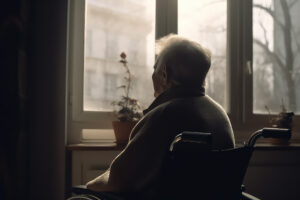 Loneliness is a global, national, widespread epidemic, according to the World Health Organization and U.S. Surgeon General, which advised in 2023 that the “pressing threat” of isolation and loneliness carries dramatic possible consequences for Americans’ health, including, but not limited to, an increased risk for premature death.
Loneliness is a global, national, widespread epidemic, according to the World Health Organization and U.S. Surgeon General, which advised in 2023 that the “pressing threat” of isolation and loneliness carries dramatic possible consequences for Americans’ health, including, but not limited to, an increased risk for premature death.
A November 2023 survey conducted by NeighborWorks America, an organization with a mission to match families with affordable homes, revealed that the impacts of social isolation in the U.S. are even more intensely felt among historically marginalized groups, such as lower-income Americans, Black and Hispanic communities, and those living in urban areas.
Researchers at NeighborWorks found that Americans believe secure housing is a vital tool when it comes to repairing the loneliness and isolation problem.
Twenty-seven percent of NeighborWorks survey respondents said affordable housing was most important when it comes to helping those experiencing social isolation. That’s just behind improved access to food and groceries (which 39% said is most important) and healthcare (which 35% said is most important).
More than three-in-five participants believe that communal initiatives such as increasing cooperative spaces (66%), increasing green and nature spaces (64%), and increasing access to arts and cultural activities (63%) would be the best ways to lessen social isolation.
Respondents also believe Increasing multi-unit (61%) and mixed-age (57%) housing could serve as impactful ways to address social isolation.
Most people find connection through their family, friends, neighbors and educational institutions, the survey indicated.
Three out of four Americans said social connections with friends (73%) and family members (75%) make them feel like they belong to a community.
Not far behind friends and family—and most beneficial to 55% of Americans surveyed when it comes to connectedness and avoiding loneliness—is neighbors. Sixty-five percent also cited school or educational institutions.
The physical consequences of severe isolation and loneliness can include a 29% increased risk of heart disease; a 32% increased risk of stroke; and a 50% increased risk of developing dementia for older adults, according to the Surgeon General. In an alarming comparison, the advisory stated that this makes loneliness and isolation as dangerous to one’s health as smoking 15 cigarettes per day.
Surgeon General advisories such as this one, issued last spring, are reserved for issues deemed significant public health challenges that "need the American people's immediate attention," according to a statement.
NeighborWorks conducts monthly housing-related consumer surveys which can be found at NeighborWorks.org.

 theMReport.com Your trusted source for mortgage banking news
theMReport.com Your trusted source for mortgage banking news









